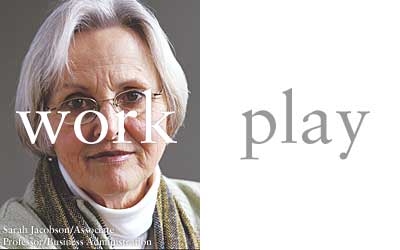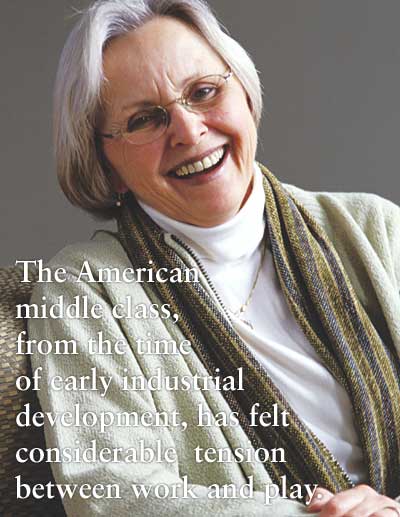
In July 2001 the White House announced that George W. Bush, some six months into a presidential term entered by virtue of controversial election, would be spending the entire month of August on vacation at his Crawford, Texas, ranch. The announcement was met by the press with derision apparently reflecting a sense that chopping wood and driving a pickup around his property were inappropriate ways for a president to spend his time - vacation or not. Or, perhaps, their reaction came out of jealousy. At any rate, Bush stuck to his plan, and, despite a few brief political junkets, maintained his retreat. Given the events of Sept. 11, who among us would begrudge him that time?
I paid particular attention to press reactions over the Bush vacation because at the same time I was making last minute arrangements for a long anticipated developmental leave. On Sept. 10, my retired husband and I were to depart Fargo to spend the fall semester in Europe. We planned to do a bit of traveling in Italy before heading north to Finland where I would be working, and Jim would read his way through a pile of books.
The previous year had been a particularly demanding one even for a person as essentially resilient as I. While I relished each activity, serving as presiding officer of the University Senate and embarking on a new research project, in addition to my usual responsibilities, made for a busy year. Then, in January, we learned that my mother was dying of pancreatic cancer. My sister and I, indulging my mother's wish to die at home, served as her primary caregivers until her death in late March. By summer I was more than grateful that my request for developmental leave had been approved the previous fall. I was elated at the prospect of time the leave offered to read, reflect, write, redesign a couple of my courses and, on a personal level, to renew my energy.
At the same time, however, I felt a nagging sense that I must be "getting away with something" - a peculiar pull between on the one hand the attraction of time away from the busy days and multiple responsibilities being a college professor implies and, on the other, the sense that I really "should" spend the fall in my office conducting business as usual. Needless to say, this conflict was not serious enough for me to abandon my plans. However, it was serious enough for me to feel somewhat uncomfortable sharing the story of my good fortune easily with any but my closest friends and colleagues. What could be the matter with me?
Prompted by these feelings I read a book over the summer by Cindy Aron, a history professor at the University of Virginia, called "Working at Play: A History of Vacations in the United States." It is a fascinating read in which Aron chronicles the history of the vacation concept in the United States from the early 19th century forward. Aron argues that the American middle class, from the time of early industrial development, has felt considerable tension between work and play. On the one hand, reaching a level of economic security that made vacations possible, was a highly valued goal of 19th and 20th century Americans. On the other hand, there has long been cultural suspicion and discomfort with the idea of leisure for leisure's sake.
The end result has been twofold. First, long vacations like that of President Bush are uncommon and, when taken, suspect. Americans have been labeled the most "overworked nation in the world" surpassing even Japan. We seem proud of that fact. Until quite recently most companies, both large and small, allowed just two weeks of paid vacation for employees with less than five years of service. Today, while about half of all large companies offer three weeks, it is uncommon for workers to take those weeks at one time. Contrast this with European countries where almost everyone is allotted four to six weeks of vacation per year. Many Parisians, for example, depart for the entire month of August filling French highways and leaving the city to tourists.
The second effect of our uneasy relationship with leisure, and one that has more to do with leave granted to professors, is that when Americans vacation we take our work with us or, as Aron notes, "fashion vacations that substitute for work." Connected by laptop, email, cell phone, fax and the FedEx truck, we Americans can literally work anytime, anywhere. Many of us do - even on our porch at the lake in the heat of August. Or, instead, with the goal of active self-improvement, those of us who can afford it may spend our vacation time in service activity somewhere around the globe, or learning a new skill like cooking or a language, or exploring a particular avocation like genealogy or archaeology, or engaging in challenge with long-distance bicycle trips or white water rafting or losing weight.
Reading the Aron book put my ambivalence in perspective. It helped me to understand the source of my discomfort, which I elected to dismiss and, prompted by the excitement of the moment, I left for Europe with great anticipation and joy. After all, I wasn't abandoning my work, I was just moving it to another location!
Jim and I arrived in Amsterdam early in the morning on Sept. 11 and took a train north to Groningen where the NDSU College of Business is in partnership with the university. The purposes of our trip to Groningen were to visit the university and to take two former exchange students out for a promised dinner. After arriving, we had lunch and then, because we were tired (a tourist class flight from Minneapolis to Amsterdam will do that to you) and needed to be fresh for the evening ahead, we decided to take a nap. We were awakened about 5:30 p.m. by the ringing of the telephone - a call from one of the professors I was to visit expressing his concern and sorrow over planes having crashed into the World Trade Center. I remember saying, "What a terrible accident!" My colleague replied, "No, I'm afraid it appears that it was not an accident at all but an act of terror." We immediately turned on CNN and stayed pretty much glued to it, between appointments and tours, for the next several weeks.
There was no way that day or for most of the next to reach our five grown children by telephone. However, early on Sept. 12 we went to the public library in Groningen where access to email was available. It was a tremendous relief to find a way to contact our family, to know they were OK, and to let them know we were too. Also, on that day, I was able to help the faculty and staff at the university by meeting with the American exchange students who had arrived in the Netherlands no more than a week before and who were, understandably, scared to death. It seemed to help them to have an American adult around.
At first we thought we might abort our trip and head for home. It was unclear from that distance, as I understand it was here too, whether the attack was to be an isolated event or signaled more extensive violence. Our children encouraged us to come home as soon as possible. However, since flights to the United States were grounded for several days, and subsequently overbooked to accommodate all of the Americans stranded in Amsterdam, there was literally no way to get home. So we stayed on and flew to Milan, agreeing to re-evaluate our decision daily at first and later weekly. Before we knew it, it was December.
We are both glad we decided to stay. People in the countries we visited could not have been kinder or more supportive. The almost 60 percent drop in American tourism in Europe over the fall made it possible to actually get within viewing distance of the "David" in Florence and "The Lord's Supper" in Milan. We joined flocks of other tourists from all over the world as well as a sizable group of citizens of Milan in the palatial and somber Duomo to silently mark the week's anniversary of the attack, emerging into brilliant sunlight and the pealing of church bells throughout the city. It was a moving reminder of the solidarity of so many people around the world in the face of terror.
We spent five weeks in eastern Finland, taking long walks along the banks of beautiful lake Saima, observing the progress of autumn when I took breaks from my work with a long-time colleague and collaborator at Lappeenranta Technological University. We lived at the university, and I was loaned a bright, spacious and quiet office where I spent my days writing. My colleague and I conducted a research workshop for faculty and doctoral students, and I was a guest lecturer in several of her classes.
We took a train one weekend to St. Petersburg and attended two ballets. We attended a symphony concert in Lahti and met its musical director, Osmo Vanskaa, who is moving to the Minneapolis symphony. We spent our final weeks in Germany, where I taught an international business module at the Berufsakademie in Mosbach, a lovely town in the Neckar River Valley about 35 kilometers from Heidelberg.

Over the fall, I accomplished all of the work I set out to do - the writing and the planning of new research and the course revisions, the chance to talk about my ideas, and the chance to teach in a new venue. Jim managed to finish most of the books he planned to read. The trip was a perfect combination of work and play. We were very happy and relieved when our plane landed at Hector field, glad to be home, but incredibly grateful for our experiences.
In January, I returned to the classroom feeling "re" freshed and "re" created - exactly the way one is supposed to feel after leave. Along the way, however, the two of us also learned some important life lessons that we did not expect to learn at our ages. From the Italian rail system that mysteriously goes on strike every Sunday, we learned patience and flexibility and the value of giving up thoughts of being in control. After pulling heavy duffels and lugging sizable carry-on luggage for several weeks, we discovered the virtue of economy, keeping only items we absolutely had to have, and sending the rest home.
We learned humility as we struggled to be understood in a series of unfamiliar and often incomprehensible languages - it is not true that everyone in Europe speaks English, especially in Russia. A driving tour around St. Petersburg with its depressing apartment complexes from the period natives call "the time of stagnation" offered the lesson of appreciation for all that we so often take for granted.
In the aftermath of Sept. 11, we came to appreciate in a dramatic way the fragile interconnectedness of this world and the precious commonality of human experience. Most of all we experienced the essence of time well spent and incredible gratitude that I am able to do work that I love that offers this kind of opportunity. No more ambivalence about that for me.
Aron, Cindy S. (1999). "Working at Play: A History of Vacations in the United States." New York: Oxford Press.

































